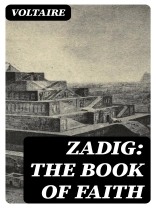In 'Zadig: The Book of Faith, ’ Voltaire offers a captivating narrative that intertwines philosophical inquiry with a rich tapestry of adventure and romance. Set in ancient Babylon, the story follows the protagonist, Zadig, on his quest for knowledge and understanding amidst a maze of life’s injustices. Voltaire employs a vibrant prose style suffused with irony and wit, exemplifying the Enlightenment’s questioning of religious dogma and social convention. The text serves as an allegory for the pursuit of truth, critiquing the societal norms of his time through a blend of humor and profound skepticism, thus placing it squarely within the context of Enlightenment literature. Voltaire, known for his sharp intellect and relentless critique of authority, was a prominent figure of the Enlightenment. His experiences of exile, censorship, and his views on religion greatly influenced his writings. In this particular work, he is inspired by the philosophical debates of his era, advocating for reason and tolerance. Voltaire’s background as a satirist and a keen observer of human nature lends depth to Zadig’s trials, shedding light on the folly inherent in blind faith and societal hypocrisy. 'Zadig: The Book of Faith’ is a must-read for anyone interested in the intersections of philosophy, literature, and social commentary. Voltaire’s timeless exploration of faith, reason, and existential searching continues to resonate today. This engaging narrative not only entertains but also provokes reflection on the nature of human existence and the search for truth, making it a significant addition to any literary collection.
O autorze
François-Marie Arouet, known by his nom de plume Voltaire, was a towering figure of the French Enlightenment, distinguished for his wit, philosophy, and fierce criticism of religious dogma and French institutions during his time. Born on November 21, 1694, in Paris, France, Voltaire was educated by the Jesuits at the Collège Louis-le-Grand. His early career saw imprisonment in the Bastille for his satirical verses. A prolific writer, Voltaire’s oeuvre includes works on history, philosophy, and literature, as well as plays, poems, and essays. His sharp pen championed civil liberties and freedom of thought and religion. Voltaire’s 'Zadig: The Book of Faith’ is a prime exemplar of his literary style, blending philosophical tale with a satirical edge, exploring themes of fate and free will. This mode of story-telling allowed Voltaire to address profound philosophical questions within an accessible narrative, thus broadening the public discourse of his time. Throughout his life, Voltaire corresponded with monarchs, scientists, and fellow philosophers across Europe, engaging in the crucial intellectual debates of his century. He spent his last years in Ferney, where he also established a watchmaking industry to help the local economy. Passing away on May 30, 1778, Voltaire’s legacy endured, with his thoughts and writings continuing to influence thinkers and writers for centuries to come.












